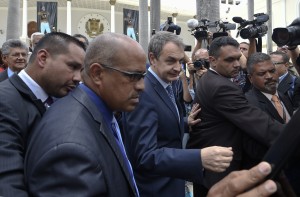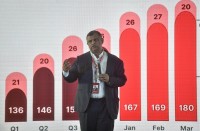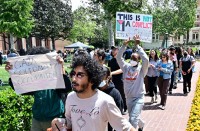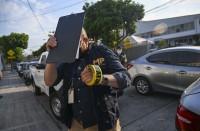
Venezuela’s opposition on Thursday kept pressure on beleaguered President Nicolas Maduro after protests demanding his ouster amid a mounting political and economic crisis. / AFP PHOTO / JUAN BARRETO
CARACAS Venezuela (AFP) – by Maria Isabel Sanchez and Marc Burleigh
Venezuela’s opposition leader met with foreign mediators in Caracas on Thursday in a bid to up the pressure for a recall referendum against embattled President Nicolas Maduro.
The closed-door meeting between Henrique Capriles and former leaders of Spain and Panama came after Maduro threatened to strengthen a state of emergency imposed this week following anti-government protests.
The demonstrations that took place in two dozen cities including the capital on Wednesday resulted in 30 arrests, according to the opposition and rights groups.
Maduro’s Socialist Unity party said seven police officers were hurt in Caracas, where riot squads firing tear gas blocked a march of 1,000 protesters.
The confrontations exacerbated international concern over oil-dependent Venezuela, whose economy is being torn apart by a brutal recession, hyperinflation, and food and electric power shortages.
The opposition has rejected the state of emergency, urged the public to defy it, and encouraged the army to side with it against Maduro.
“The people want to RECALL you!” Capriles tweeted at Maduro.
On Thursday, Capriles and parliamentary speaker Henry Ramos Allup met with former Spanish prime minister Jose Luis Rodriguez Zapatero and former Panamanian president Martin Torrijos to discuss the situation, including an amnesty they are demanding for political prisoners.
US ‘deeply troubled’
The US State Department said it was “deeply troubled” by the situation in Venezuela. A spokesman said: “Reports of excessive use of force and violence against protesters obviously is troubling to us and of deep concern.”
Senior US intelligence officials have already said they believe the South American nation is in “meltdown” and at risk from public revolt.
The head of the Organization of American States, Luis Almagro, has said Maduro would be considered yet another “petty dictator” if he continued to reject the referendum.
A senior Vatican official, Paul Richard Gallagher, secretary for relations with states, canceled plans to visit Venezuela next week to help mediate because of the escalating unrest.
Maduro has blamed the US and the “fascist” right in his country for the adversity he faces.
To counter foreign “armed intervention,” he has ordered military exercises that will take place Friday and Saturday.
The defense minister, General Vladimir Padrino Lopez, said the drill, termed “Independence 2016,” would show off military planning sparked when US President Barack Obama last year designated Venezuela a threat to national security.
Padrino Lopez, speaking in a televised address, said the exercise would be “unprecedented” and involve more than 500,000 soldiers and militia members.
The accusation of US meddling is the same one Maduro’s late predecessor, Hugo Chavez, often raised.
But it appears Maduro has not convinced Venezuela’s population the problem lies elsewhere. Seventy percent want a new government, according to recent polls.
Maduro and his military chiefs “want big military maneuvers so the people feel afraid,” said Benigno Alarcon, director of political studies at the Andres Bello Catholic University.
“Using the excuse of external threats is a good way of showing they have armed muscle,” he said.
Disputed petition
The Venezuelan president has vowed that the opposition referendum will never take place.
“I will not hesitate” to ratchet up the state of emergency “to fight for the peace and security of this country” if necessary, Maduro said Wednesday.
His extraordinary measures came into effect this week for a period of 60 days. They can be renewed and Maduro has said they probably will be, through next year.
The decree gives sweeping powers to the security forces to impose public order, and to help distribute food.
Even though the congress has rejected the decree, the Supreme Court, which is stacked with Maduro loyalists, is likely to confirm it.
In that case, the opposition has called for the public to defy the state of emergency.
It has also accused the National Electoral Council (CNE) of stalling on validating the recall referendum petition, which it said attracted 1.8 million signatures.
Maduro and his vice president, Aristobulo Isturiz, claim the petition is riddled with fake signatures and there is no basis for a referendum.
Instead, Isturiz has urged the opposition to sit back and contest the next presidential election due in December 2018.
“If you win, Maduro will give up power. Easy. What’s the problem?” he asked.
If the opposition manages to bring about a recall referendum, the vote must constitutionally be held before January 10, 2017 for it to trigger new elections.
Any later than that, a successful recall vote would simply transfer power from Maduro to Isturiz.







